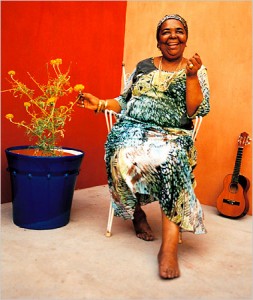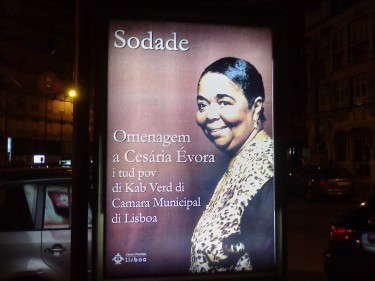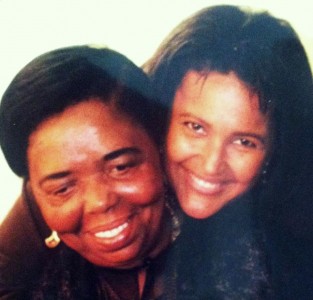On December 17, 2011, Cesária Évora, a musical ambassador of sorts for Cape Verde, left us. There was an abundance of tributes and declarations by her faithful audience, present in almost every corner of the globe. The singer, as well as the music of her country, were the focus of the blogosphere in recent days, and in the twittersphere Évora became a Trending Topic on the day of her death.
Julio de Magalhães, from the blog Do Médio-Oriente e afins (From the Middle East and the like) [pt] commented on the departure of the singer and highlights the music of her country:
Foi uma voz de Cabo Verde escutada e aclamada em toda a parte e, de alguma forma, um símbolo nacional. Dotada de um inconfundível instrumento vocal, como aliás grande parte dos cabo-verdianos, apresentou-se nos principais palcos do mundo sempre com extraordinário sucesso.
For Brazilian journalist Mauro Ferreira, of the blog Notas Musicais (Musical Notes) [pt] “a sweet voice of deep feeling has been silenced”. On her music, he says:
Voz que destilava a fina melancolia impregnada nas mornas – espécie de samba-canção da terra da intérprete – que entoava em crioulo, um idioma que misturava português, francês e dialetos africanos. Évora também deu voz às coladeiras, outro ritmo cabo-verdiano, mais dançante e próximo da pegada caribenha.
The blog Palavras Todas Palavras (Words all Words) [pt] commented in retrospective on the success of the album La diva aux pied nus (The Barefoot Diva), recorded in 1988, which alludes to the way she appeared on stage:
O álbum foi aclamado pela crítica, e em 1992 gravou Miss Perfumado, e passou a morar na França. Tornou-se uma estrela internacional aos 47 anos. Em 2004 recebeu um Grammy, de melhor álbum de world music contemporânea. Foi a cantora que recebeu maior reconhecimento internacional na história da música cabo-verdiana.
The Portuguese blog Repórter a Solta (Reporter on the Loose) [pt] emphasized her great energy on stage based on a report from her shows in London:
Cesária não pára. Desde que, aos 48 anos, começou, em França, a sua carreira internacional, passa a maior parte do ano em tournée pelo mundo. Não está cansada? “É preciso aproveitar, agora que há trabalho”, diz-nos ela, como inconsciente de ser uma estrela mundial, como se vivesse nos tempos miseráveis dos bares do Mindelo. “Enquanto puder, não páro”. Na plateia, (…) são raros os caboverdianos, ou mesmo os espectadores de origem africana. São britânicos na sua maioria, famílias, casais, jovens, de meia-idade, classe média-alta…” Eles não percebem nada do que eu canto”, diz-nos Cesária. “Ninguém entende crioulo. Mas não importa. A música diz tudo. Entendem a música”. (…) Como faz ela aquilo? É um truque? Um sortilégio? Ninguém sabe explicar, mas está lá todo o fascínio de Cabo Verde.
In retrospective, and in a critical tone, anthropologist Miguel Moniz, guest contributor to Southcoasttoday, wrote about the space occupied by the singer on the international scene:
Cesaria Evora left Mindelo, Sao Vicente, to sing the morna on the world's great stages, winning a Grammy and becoming a chevalier in the French Ordre National de la Legion d'Honneur along the way. Although she had been performing on and off since the 1950s, it was not until the release of two albums in the 1990s that Cesaria would emerge to international acclaim in the “world music scene,” a ubiquitous though absurd catch-all category that seems to mean “music made by people from some weird place I've never heard of.”
Still on the likely unfamiliarity of the international audience with Cape Verde, the blog Passaport to wrote:
Not too many people know much about (or have even heard of) the tiny, 10-island West African country of Cape Verde. But even though relatively few actually understood her song lyrics, plenty in Europe, Africa, and the rest of the world certainly knew and loved its most famous native daughter. (…) But the lady has left behind a gorgeous legacy (…) that have taught the world about Cape Verde’s distinctive national music, called morna.
The directions of Cape Verdean music
And with Cape Verde in focus, a debate has arisen over who will take her place as musical spokesperson of the country.
The current scenario is quite far from that found by Cesária Évora. Attention was drawn to the fact that the majority of representatives of Cape Verdean music of the new generation are “daughters of the diaspora”:
As candidatas à sucessão de Cesária Évora como “a voz de Cabo Verde” são cabo-verdianas nascidas em outras partes do mundo, na maior parte dos casos em Lisboa. Mayra Andrade, a mais bem colocada, nasceu em Cuba e vive em Paris. Se Cesária Évora, falecida no sábado, era, é, “a voz de Cabo Verde” e o maior emblema internacional do país, o desaparecimento físico da diva dos pés descalços deixa vago, de certa forma, o lugar que a filha do Mindelo até aqui ocupava no panorama musical internacional. As candidatas à sucessão são várias e mais ou menos conhecidas, tendo em comum o facto de, ao contrário de Cesária, não terem nascido em Cabo Verde e serem, antes, filhas da diáspora crioula.
Among the names cited are Mayra Andrade, Lura, Nancy Vieira, Sara Tavares, Carmen Souza, Maria de Barros, Danae and Isa Pereira. Some were born in Cape Verde, and others were not, some spent time in the country and others have not, and with various musical influences, as the case of Carmen Souza, who mixes Cape Verdean traditions with jazz, or Maria de Barros, with influence of Latin music, principally salsa.
There appears to be an effort to renew Cape Verdean music and make connections with other music, but with strong links to the roots of musical tradition of the country. What is notable is that the doors for Cape Verdean music were opened by Cesária Évora and the strength of her work, that in one form or another appears influential in the work of all of those singers cited above, be it musically, be it by inspiration and love for the country and for its language. And it is hoped they will continue on with her legacy in one way or another.
Whatever the future directions of Cape Verdean music internationally, the presence of Cesária Évora was unique and will always leave Sodade. Tom Devriendt, of the blog Africa is a Country, explains the meaning of one of the most beautiful words of the Portuguese language: “Saudade” (“Sodade” in Creole) – also the title of a song that made her famous throughout the world – and he shares the video for the song “Dor di Sodade” (The Pain of Sodade) from the album “Radio Mindelo” (2009) with old photos of the singer:
One of the many meanings of “Sodade” — that most difficult to translate Creole word — is a feeling of loss.










2 comments